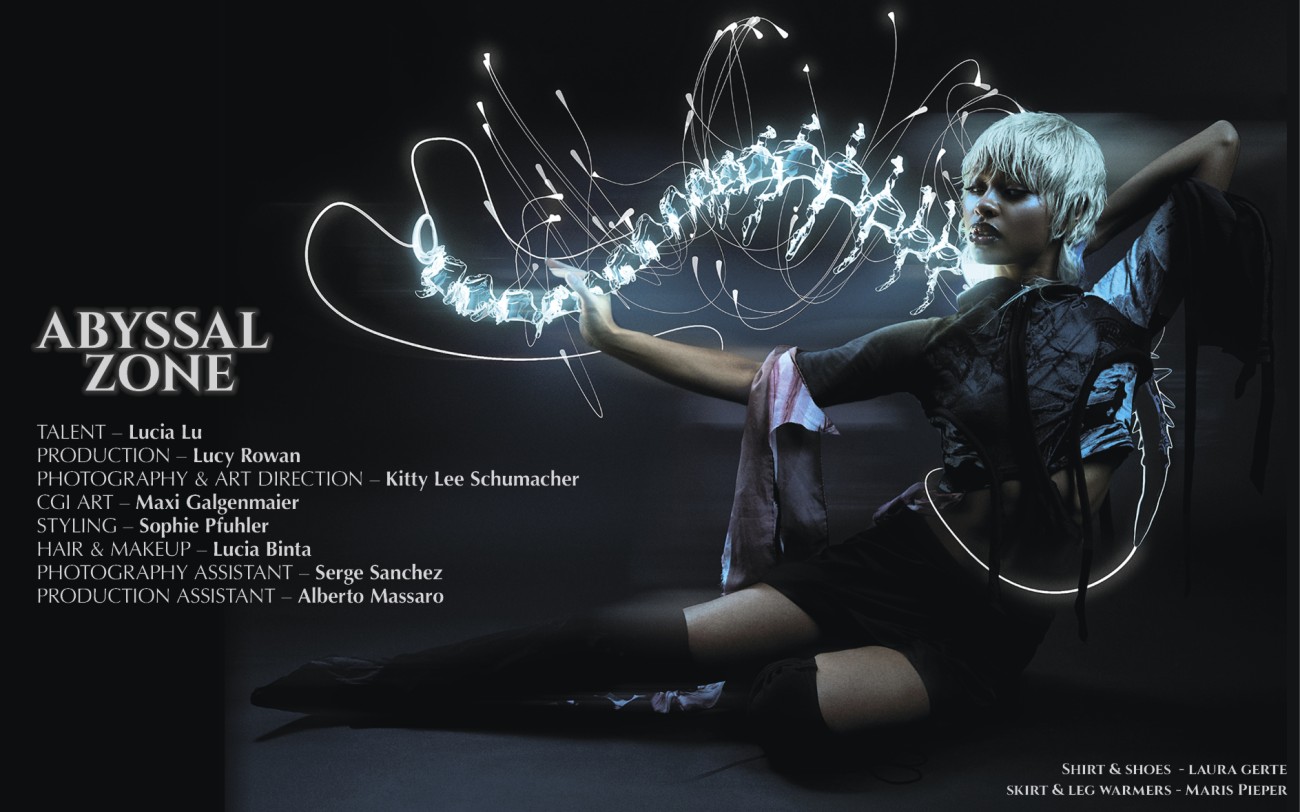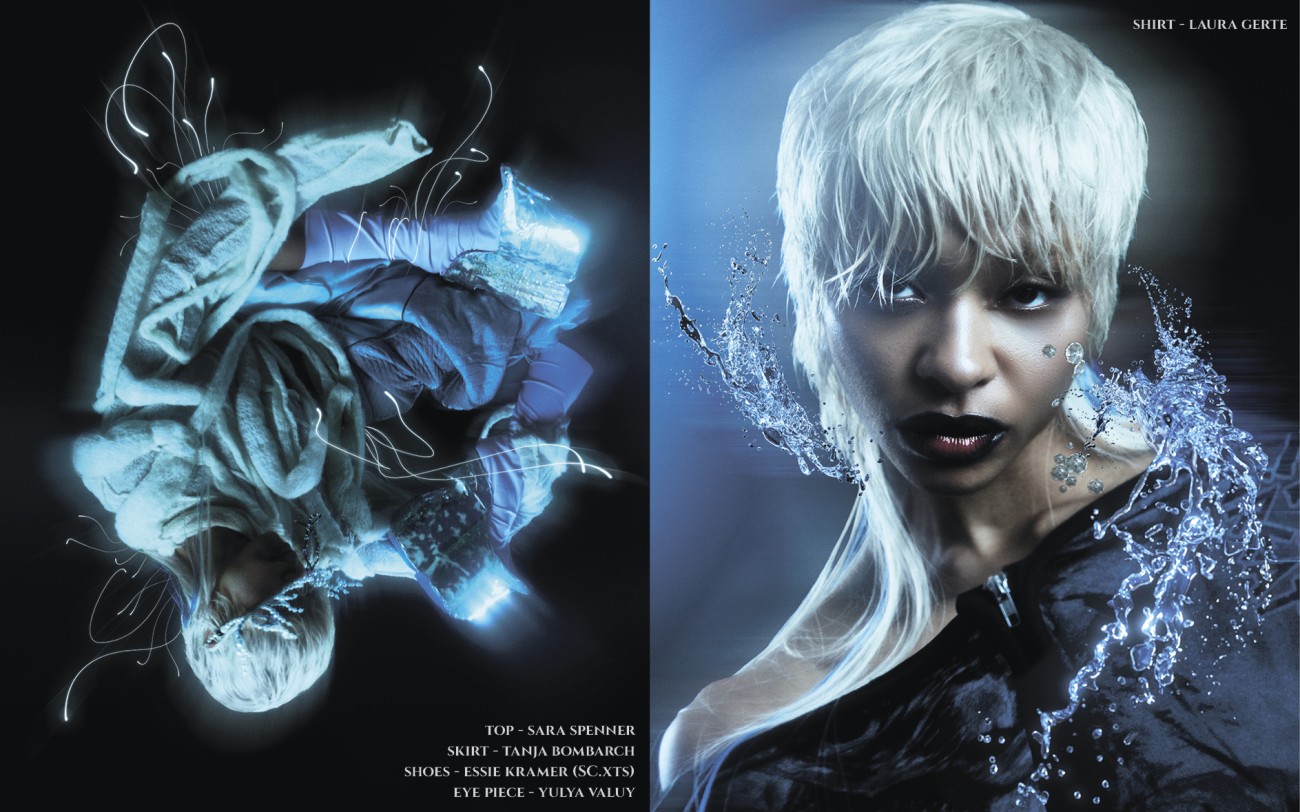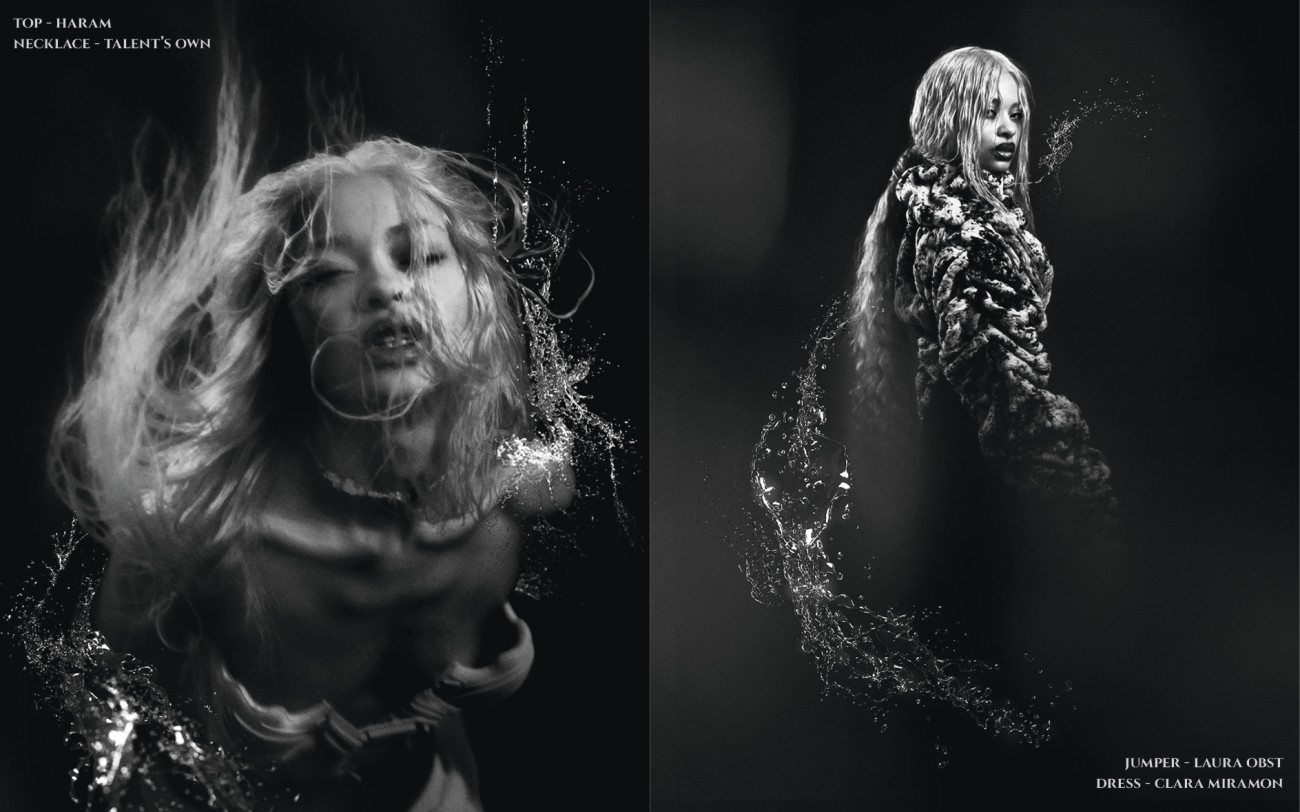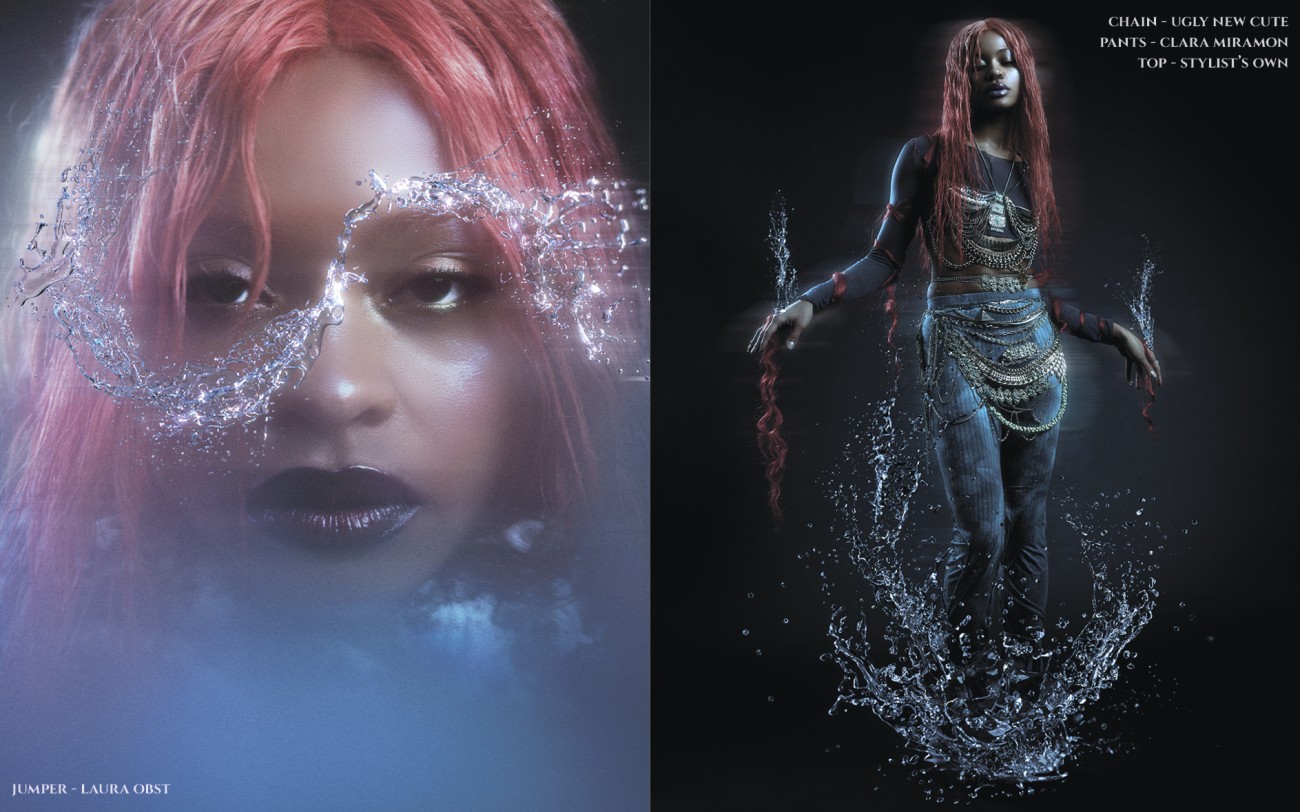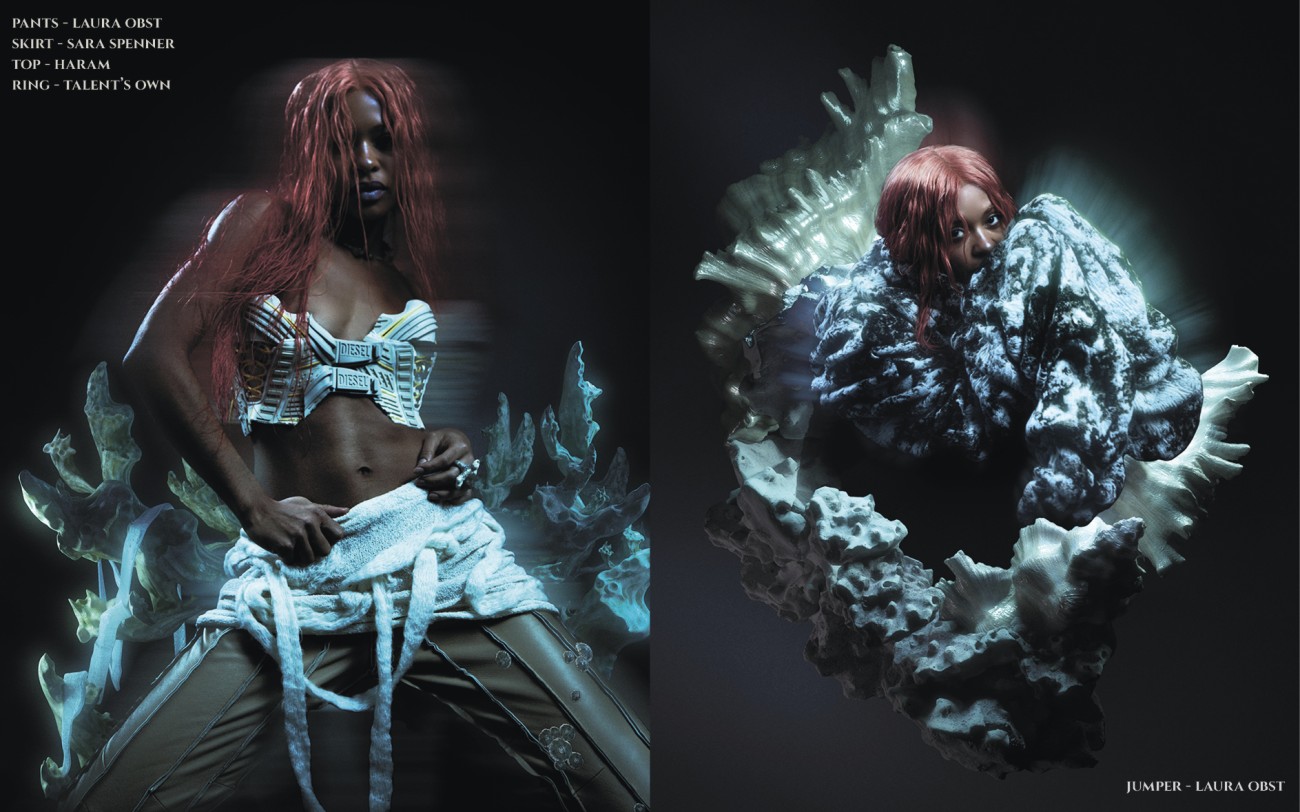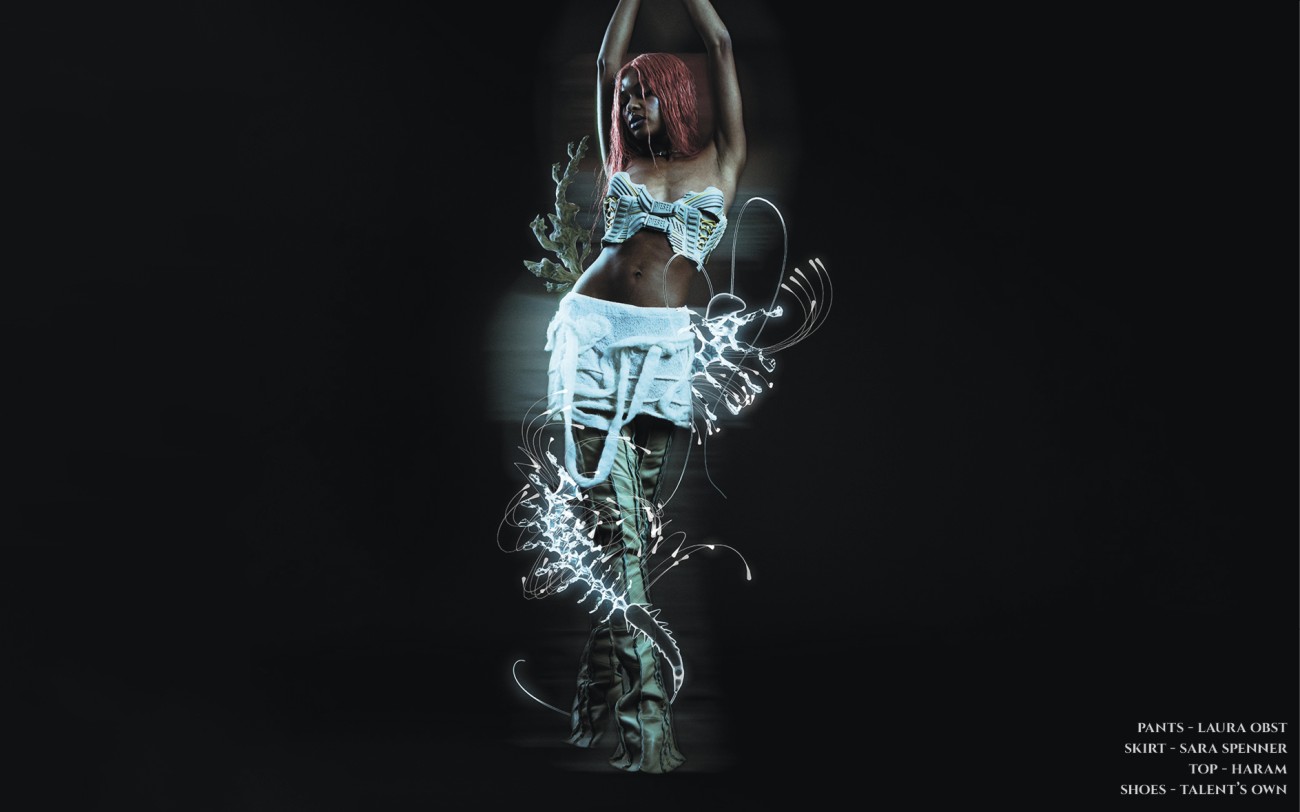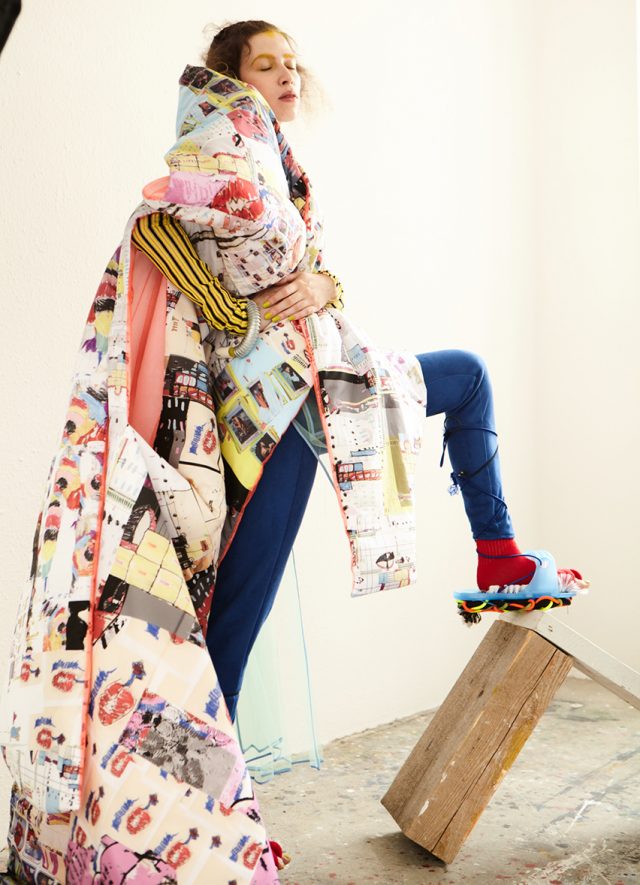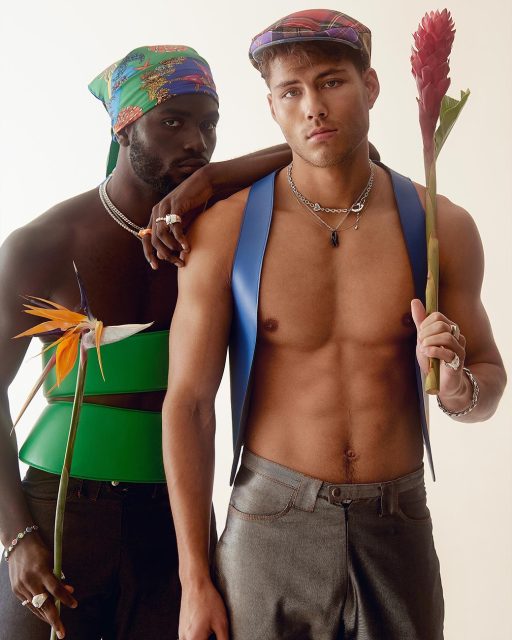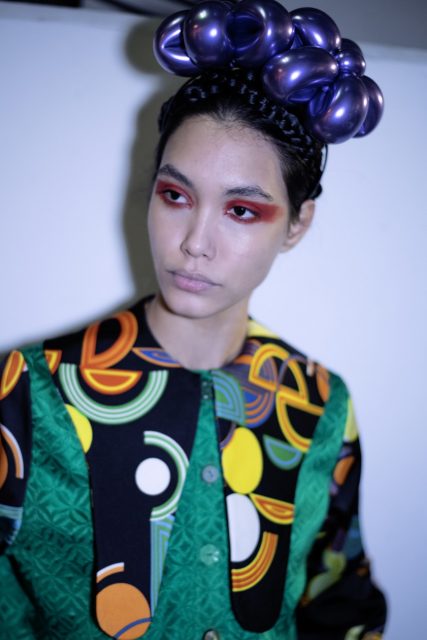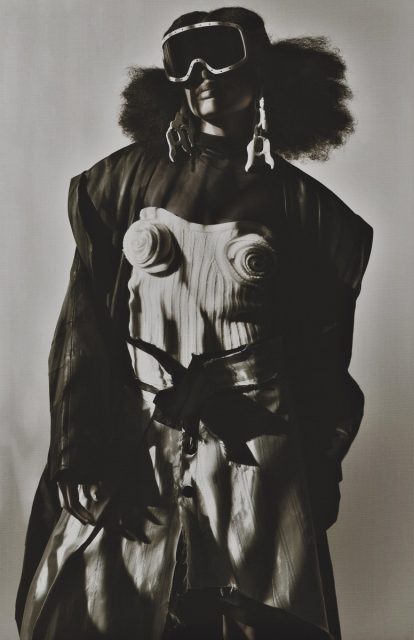DJ Lucia Lu arrives at every set with an abundance of energy and sass. Her bouncy beats and blending of genres are right on trend for this new wave of techno that has been washing across Europe. As a result, it has become uncommon not to see her name listed on many of the scene’s staple lineups.
Although she only dived into playing techno around the time of the pandemic, she has been making waves in the music world for the past six years. As one of the founders of queer hip hop collective Hoe_mies, Lucia was a key figure in redefining how Berlin thinks about hip hop – a genre that has been previously criticised for its misogynistic and sometimes violent content. She and co-founder DJ Meg10 endeavoured to create a space that elevated and ensured the safety of FLINTA* and queers who love the genre for all the right reasons. Hoe_mies since inception, has been committed to making respect and non-discrimination core club night values.
For this Œditorial, she has lured us to the Abyssal Zone, embodying her inner siren. We caught up with her at PLATTE.BERLIN to talk about podcasting, cancel culture and her greater mission as a queer person of colour. The selection of clothing showcases independent, Berlin-based fashion talent.
Œ: You’re an echte Berlinerin – what was it like growing up in Berlin? How has the city changed since you were a child?
Lucia: The thing is when you’re growing up here, you don’t realise that it’s anything special. As a child, you don’t really have the scope to understand how large and diverse the world is. Most children in Berlin learn from a very young age to walk or take public transport by themselves to go to school. When you grow up you first get to know your Kiez, then the district of your Kiez, and later, you explore what all the districts have to offer.
You grow up with all the opportunities a big city can offer but you also see a lot of poverty, drug addicts, dealers, homeless and quite often, crazy people on the streets, in the park or at the metro station. You also have social focal points and trendy hotspots. I feel very lucky that I grew up in Moabit. It’s very diverse and green.
Nowadays, when you go out you can meet people from all over the world, we have a lot of cool startups that were born here, and a lot of fresh brands that have settled here. I love that Berlin is constantly changing and attracting so many people from all over the world.
Œ: You and your school friend DJ Meg10 founded the party series Hoe_mies – What was your vision for this? Does hip hop have a place in the “Mecca of Techno”?
Lucia: Oh yes, hip hop has a place in the “Mecca of Techno” and the place is very needed. Hoe_mies is still the best hip hop party showcasing international artists in Berlin! Our vision was to create an intentional space in the hip hop scene where femmes and queers can feel safer by being one of the first parties that started working with awareness teams and key rules to have a peaceful night. We were working hard to build a community that empowers the very few marginalised femmes and queers in the global hip hop industry.
We became a platform for so many artists and had the opportunity to work on different projects as a DJ duo, podcasters and creatives. The vision for Hoe_mies was to share music, celebrate who we are and share skills so that we could elevate the community. I still stand behind this project we gave birth to in 2017, and I hope there will be more hip hop parties that focus on communities.
Œ: Where did your love of hip hop come from?
Lucia: How can you not love hip hop?! I didn’t play only hip hop before I transitioned to techno, I also played latin music like dembow reggaeton and music from the Caribbean like dancehall, reggae and soca. I love this music because I grew up with it. So many artists from these genres have inspired me and still do. I can’t wait to produce my music and fuse everything I like when I play.
I hope everyone that loves music is also taking the time to learn about the culture and the creation of a certain style. It contains so much knowledge and deeper meaning and it is so important for people to express themselves and to speak their truth. I honour hip hop and latin and caribbean music because it’s music from the black diaspora.
Growing up in white Germany, this music was the connection to my roots. When I found out that the early founders of house and techno music are black and how much the electronic music scene has been whitewashed, I decided to no longer only enjoy the music in my private party life, but to also work with it. This felt like a mission.
Œ: You and Meg10 hosted a podcast series called Die Realitäter*innen, which was a Spotify original format with a community focus on elevating voices of colour. How did that come about?
Lucia: When Meg10 and I were touring as a DJ Duo, we were constantly meeting so many interesting people so we were thinking already about a way to share those conversations with a broader audience. Spotify came just at the right time and opened that door. When you talk regularly about these deep topics, you don’t have much time for music anymore because you are constantly looking for interview partners and working on the questions for the episodes. It was such a nice experience, which I am very grateful for, but it was also really time-consuming.
When we first started, I was definitely shyer than I am now. I just remember the first few episodes, speaking into this mic and thinking “Oh my God! Say less so you don’t say anything you regret!” I don’t know, I guess I was scared. Now I’m comfortable completely being myself since we already had this crazy “cancelling” story.
Œ: This was regarding someone you hosted on the show. What exactly happened?
Lucia: We invited someone on the show who at the time we didn’t know was suspected of physical assault, later it became sexual assault. We were contacted by those who claimed to be the friends of the victim – they wanted us to take the podcast down. Since it was a Spotify podcast, this was not in our own hands.
After the public callout, it took us a week or two to present the middle ground between all parties involved. The episodes were edited, and we cut out the parts of the alleged perpetrators. I thought it was unfair to remove the full episode because we always had two guests. At that time we were one of the very few black and brown German-speaking podcasts and on top of that, it was a Spotify Original Podcast. We always had that platform character so we wanted to involve as many black, brown and queer voices as possible. This podcast was a chance to share their perspectives.
When people started calling us out online, at first, we were freaking out because it felt like the whole public was looking at and shaming us. In those moments, you just sit there and think: “How could this happen?! You, as a queer feminist, how did you let this happen?” You are in a place of leadership and responsibility – you just feel so embarrassed. Even though it was happening within this bubble of people, it felt like everyone knew about it.
Œ: It really feels like “cancelling” is a part of popular culture at the moment. How did you handle such a difficult period? What did you learn from this experience?
Lucia: For me, it was particularly heartbreaking that our podcast, which had such a strong focus on community was publicly under under fire and labelled as a platform for abusers so quickly after it had just launched. Our guests were often local people that were not in the public eye. So how could we have known this about them? Who were we to judge?
At one point, I was scared to go outside and became quite depressed from it. Then after going through these heavy emotions you start to feel anger – you wish you could sit down and speak to these people in person, but they only ever interact anonymously through the internet. They started to create this campaign against us, spreading information about us that wasn’t true and then, the suspected victims targeted us. The worst part was how we as women were attacked in the public even more than the men who were suspected of doing wrong. We lost business partners and jobs – at some point, you know this has to stop.
But we came back stronger. I feel like now I have nothing to fear – the worst has already happened. It’s not easy to talk about this topic because it has so many layers. You have the victim, the suspected perpetrator, and then you have the system, which is clearly not efficient enough because all these cases fall into the hands of the people around them with no experience. I understand and empathise with the frustration of the victims. I learnt a lot from it and I now know a little better about how these systems work. But I also know I am not a judge, nor the police, nor a psychologist. I am not a professional on this. I bought some books to educate myself and I listened a lot. This topic is ongoing – sexual assault is happening more than ever and we need better infrastructure to tackle it. The system we currently have is not working.
Œ: As your followership grows, what impact would you like to make in the music scene?
Lucia: Uhhhh, tough question! I would like to see more diverse lineups and more wealth for everyone working in the nightlife sector. I want everyone to feel valued and appreciated at work. The music scene is for a lot of people and my prayers go out to those that make it happen weekend by weekend, festival by festival. The scene in the end is a mirror of our world structures so disparity is also a big problem here. I just hope one day this will shift!
Œ: Although queer culture is celebrated and centric in the city, when I speak to Berlin-based DJs there is still a lot of dissatisfaction regarding FLINTA* and BIPOC bookings at parties. What are your thoughts on this?
Lucia: I agree that the lineups can be more diverse overall. Despite the disparity, I also want to acknowledge all the incredible FLINTA* and BIPOC artists that came out this year and all the DJs that paved the way for us over the last couple of years.
There are so many new DJs from all over the world and I’m so curious to find out more about them! I also believe in creating your own space instead of waiting to be invited. Start your own parties or gatherings, and build your audience! It’s very much needed all over the world, this proactive attitude.
In general, I have the impression that way more people than ever are aware of the issue and are open to making changes. I think long-lasting changes take a longer time to materialise but I’m very optimistic!
Œ: Is there a party or club that has had the greatest impact on you?
Lucia: Berghain is where it all started. Even though the club has changed a lot, it will always be my first love. Another queer party I’m really happy to have in Berlin is ‘fluid.vision’. I only played there once but the love and energy there were just different!
Another party I want to mention is ‘no drops’, a party series in Haifa, Palestine/Israel. Firstly, I am so thankful for the chance I had to experience playing at this party. Even though I had to go through a tough airport questionnaire procedure, Haifa really made a big impression on me. ‘no drops’ is a party that brings people together on the dance floor despite their religious background or ethnicity, something so rare but so beautiful because it shows what is possible. I love parties that have a mission.
Apart from that, the year has just begun and I’m very sure there will be more new party series coming out I’m very excited to get to know them!
Œ: In this editorial, we have envisioned you as this mysterious, siren-like sea creature – how well do you feel you embody this persona?
Lucia: The siren vision is following me! *laughs* It all started with an extraordinary encounter with a spiritual medium that said in one of my past lives I was a water being. It evolved with people saying that in one of my Hör Berlin videos, I reminded them a lot of a mermaid, and my DJ alias name was actually Ariel! When Disney announced the movie, I was like “Shit! I might have to change the name otherwise people think I want to be the Disney princess!” So I deleted it. Since this siren theme has been following me, I was very excited to work with the theme again for a magazine.
It’s so funny – I told some people that I had a few gigs last year under my DJ alias Ariel and so far, I’ve only received positive feedback regarding the name! Let’s see. You might see Ariel floating behind the decks on a beach very soon *laughs*
Œ: For this editorial, we’ve worked with Berlin-based designers. How do you perceive the Berlin fashion scene?
Lucia: Uhhh. That’s hard to say. I wish there would be more infrastructure for upcoming designers. Berlin could do more to honour their young designers. I feel like Berlin’s impact on the global market will have its comeback very soon. I love what is happening here. The whole scene is constantly changing and I hope we implement some structures that are healthier for us and the environment.
There is this overall perception of Germans as not being fashionable – hiking boots, raincoats and practical pants *laughs* But in this city, I find it very fashion-forward, particularly when it comes to the club scene. I get inspired a lot by Berlin’s nightlife A LOT. I love people who come in outfits they created themselves – it adds another layer of excitement when you go out – this inspires me so much!
Œ: Finally, is there anything special coming up in the near future for you?
Lucia: Every date or project is still very special to me! I am very grateful for the high demand and to be able to travel outside of Germany. A very special moment was my last boiler room video. I stood in for my DJ colleague Bauernfeind. Everything was very last minute, but it became my first and very unexpected Boiler Room appearance, especially after the airport staff in Tel Aviv got on my nerves for keeping all my stuff for revision for no reason…
I hope this year I can start to make my first moves outside of Europe – that would be the dream! I also want to work more on my own music.
Talent – Lucia Lu
Production – Lucy Rowan
Photography and Art Direction – Kitty Lee Schumacher
CGI Art – Maxi Galgenmaier
Styling – Sophie Pfuhler
Hair and Makeup – Lucia Binta
Photography Assistant – Serge Sanchez
Production Assistant – Alberto Massaro
Special thanks to PLATTE.BERLIN for the shooting space.
